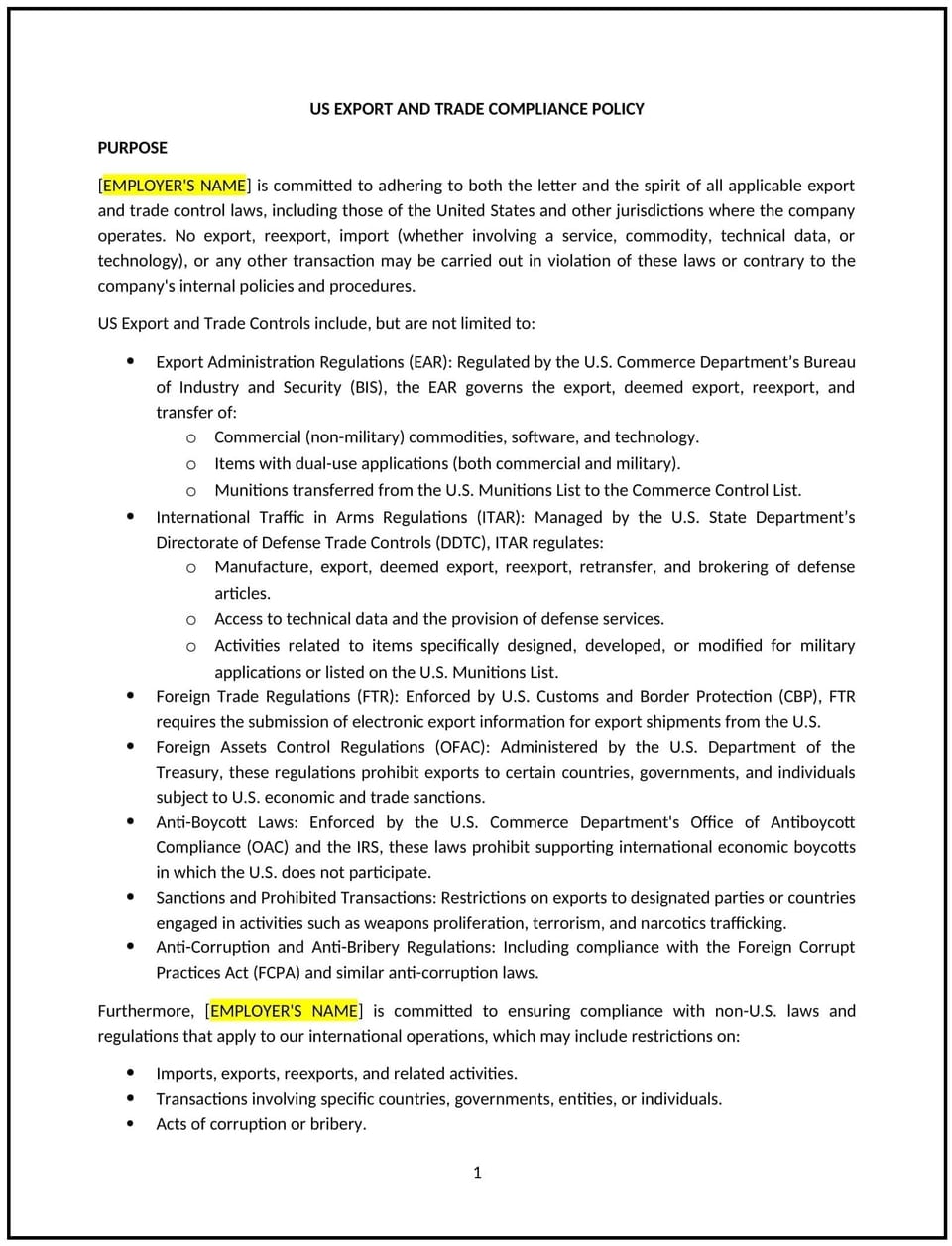US export and trade compliance policy (Kansas): Free template

US export and trade compliance policy (Kansas)
A US export and trade compliance policy helps Kansas businesses ensure they are adhering to the laws and regulations governing the export of goods, services, and technology, as well as trade with foreign countries. This policy outlines the company’s approach to complying with federal export control laws, including the Export Administration Regulations (EAR), International Traffic in Arms Regulations (ITAR), and economic sanctions programs.
By implementing this policy, businesses can mitigate risks associated with violations, protect their operations, and ensure that they engage in lawful international trade activities.
How to use this US export and trade compliance policy (Kansas)
- Define export control laws and regulations: The policy should outline the key laws and regulations that govern export and trade activities, such as the EAR, ITAR, and any relevant sanctions programs enforced by the U.S. government.
- Identify regulated products and services: The policy should specify which products, services, or technologies are subject to export controls, including those that require licenses or have restrictions on their distribution to certain countries or individuals.
- Set approval procedures for international transactions: The policy should require that all export and trade transactions, including the shipment of goods or provision of services to foreign entities, undergo approval to ensure compliance with relevant laws.
- Outline due diligence procedures: Businesses should implement procedures to screen customers, vendors, and other partners for compliance with U.S. export control laws, including reviewing potential export restrictions, denied parties lists, and restricted country lists.
- Provide training and education: The policy should ensure that employees, particularly those involved in sales, marketing, shipping, and compliance, receive training on export and trade regulations and the company’s responsibilities under these laws.
- Define penalties for non-compliance: The policy should outline the consequences for violating export and trade compliance requirements, including disciplinary actions and possible legal ramifications.
- Review and update regularly: The policy should be periodically reviewed and updated to reflect changes in U.S. export laws, international trade regulations, and business operations.
Benefits of using a US export and trade compliance policy (Kansas)
- Reduces legal and financial risk: By ensuring compliance with export control laws, businesses can avoid significant penalties, fines, or legal action resulting from violations.
- Promotes global business opportunities: A clear compliance policy helps businesses navigate the complexities of international trade, enabling them to expand their reach while maintaining legal and ethical standards.
- Builds trust with international partners: Engaging in responsible trade practices demonstrates the company’s commitment to legal compliance and ethical business operations, fostering stronger relationships with foreign customers and partners.
- Enhances operational efficiency: A structured compliance policy streamlines the process of reviewing and approving export and trade transactions, reducing delays and ensuring that the business operates smoothly in global markets.
- Protects intellectual property: By following proper export control procedures, businesses can safeguard their intellectual property from unauthorized transfer or use, especially when dealing with sensitive technologies or classified information.
- Strengthens company reputation: A commitment to export and trade compliance reinforces the company’s reputation as a trustworthy, responsible, and law-abiding entity in the global marketplace.
Tips for using this US export and trade compliance policy (Kansas)
- Communicate the policy clearly: Ensure that all employees involved in export and trade activities understand the policy, including the legal responsibilities, approval processes, and potential consequences of non-compliance.
- Conduct regular training: Provide employees with training on export and trade regulations, including how to identify restricted items, how to conduct due diligence on customers and partners, and the proper documentation and record-keeping procedures.
- Implement robust screening processes: Businesses should ensure that customers, vendors, and foreign partners are screened against government lists, such as the Denied Persons List or Specially Designated Nationals List, to avoid illegal transactions.
- Monitor changes in regulations: Export and trade laws can change frequently. Businesses should stay updated on changes to regulations, sanctions, and restrictions to ensure ongoing compliance.
- Designate a compliance officer: Assign a dedicated export compliance officer or team to oversee adherence to the policy, manage approvals, and handle any issues related to non-compliance or export controls.
- Audit and track exports: Maintain records of all exports, including transactions, shipping details, and licenses, to ensure compliance and prepare for audits or government inspections.
Q: Why should Kansas businesses implement a US export and trade compliance policy?
A: Businesses should implement this policy to comply with U.S. export control laws, mitigate legal risks, and engage in ethical and lawful international trade practices while protecting the company’s reputation and assets.
Q: What are export controls and why are they important?
A: Export controls are regulations that govern the shipment of goods, services, and technologies to foreign countries or entities. These controls prevent sensitive products from being used in ways that could harm U.S. national security or violate international agreements.
Q: How can businesses identify which products or services are subject to export controls?
A: Businesses should refer to the Export Administration Regulations (EAR) and the International Traffic in Arms Regulations (ITAR), which classify products and services based on their technology, end-use, and potential risk. The policy should guide businesses in identifying these items and ensuring they comply with licensing requirements.
Q: What should businesses do if they are unsure about export control regulations for a transaction?
A: The policy should advise businesses to consult with a compliance officer or legal advisor, conduct additional due diligence, or seek guidance from the Bureau of Industry and Security (BIS) or other regulatory bodies if they are unsure about the classification of a product or service.
This article contains general legal information and does not contain legal advice. Cobrief is not a law firm or a substitute for an attorney or law firm. The law is complex and changes often. For legal advice, please ask a lawyer.


